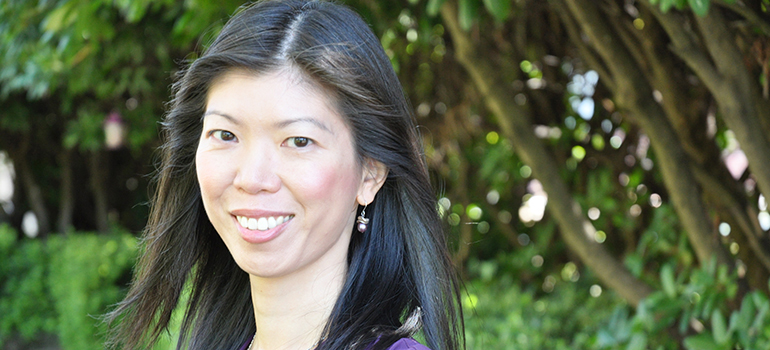
Whether it’s a debate on assisted suicide, in vitro fertilization or private healthcare, Anita Ho is on many journalists’ Rolodex to call for comments on medical ethics. Photo: Dave Lefebvre, Providence Health Care
Prof. Anita Ho talks about end of life care, unproven therapies and the difficulty with TV’s portrayal of medicine.
Anita Ho is an Associate Professor at the W. Maurice Young Centre for Applied Ethics and Director of Ethics Services at Providence Health Care. She studies complex ethical matters including assisted suicide, in vitro fertilization and private health care.
What are the major ethical questions that health professionals encounter?
One of the biggest questions is when or if it’s ethical to stop aggressive treatment in end-of-life care. The highest principle of the medical team is to do no harm. So we examine the situation from all sides and determine whether we may be prolonging suffering or incurring more harm to a patient by keeping them alive. For example, in order to administer intravenous fluids in a terminally ill patient, we may have to poke them many times to find a vein. When the patient’s organs may already be shutting down, the pain and discomfort caused by the procedure may outweigh its benefits.
On the other hand, often times the family has very different expectations with regards to the chance of recovery, or they see the prolonging of life itself as the ultimate benefit – they may not be emotionally ready to let the patient go.
How do ethicists look at controversial and sometimes unproven therapies, such as the CCSVI (also known as liberation treatment) for multiple sclerosis?
The Canada Health Act only requires that we cover treatment that’s been proven. When there is no solid evidence for long-term success, what we’re doing can be harmful to patients. I am quite cautious about patients appealing to the media because it often forces us to put more emphasis on rescuing someone who’s in front of us rather than thinking about the larger picture of how we establish sound policies and practices.
The popularity of medical shows on TV has brought some ethically challenging issues to the fore. Do they make your job easier or harder?
Definitely harder. They make certain treatments look like miracles. For example, on TV, people simply get up and walk away after a successful CPR attempt where the truth is often times CPRs result in cracked ribs, internal bleeding – when it’s unsuccessful, it’s a very bad way to die. The dramatic recovery of patients in a coma is another example where families believe sustained treatment would lead to the same results.